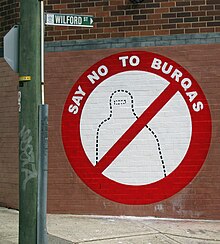| Part of a series on |
| Islamic female dress |
|---|
| Types |
| Practice and law by country |
| Concepts |
| Other |

In Australia, there is an ongoing debate over the possibility of a ban on the wearing of burqa and niqab, conservative forms of dress for Islamic women. There are currently 14 nations that have banned the burqa and niqab, including Austria, France, Belgium, Denmark, Switzerland, Netherlands, Latvia, Bulgaria, Cameroon, Chad, Congo, Gabon, China and Morocco.
Background
Following the Moscow theatre hostage crisis in 2002, Australian politician Fred Nile asked whether the then state minister of police would consider banning full-body coverings like those worn by the Chechen terrorists from parliament and public gathering places in order to prevent the carriage of weapons or explosive devices. On 23 June 2010, Nile introduced a bill into the Legislative Council to criminalize the public wearing of any face covering which prevents the identification of the wearer, including the burqa and niqab. He again in 2014 put up a bill that would ban the burqa and niqab.
In 2010, Senator Cory Bernardi wrote an opinion piece calling for a ban on wearing the burqa in public.
In September 2014, Senator Jacqui Lambie announced plans to introduce a private member's bill aimed at banning the burqa in Australia. In February 2017, she introduced a private member's bill which would amend the Criminal Code Act 1995 to make it illegal to wear full-face coverings in public places when a terrorism threat declaration is in force, unless it was necessary for certain purposes.
Arguments
A main argument for the burqa ban is security, especially in government areas such as Parliament House. It has been suggested that rather than a blanket ban, people wearing face coverings be required to show their face for 'security and identification purposes' in these places exclusively.
Those for the ban have argued that men force Islamic women to wear the dress; however, Islam does not require women to cover their faces. Some Islamic women say they feel 'naked' walking out without wearing a burka, and that a ban would effectively 'force' them to stay at home.
The ban has been criticised for conflicting with Section 116 of the Constitution, which prohibits the federal government from making any law 'prohibiting the free exercise of religion'.
State-level enforcement
In September 2011, Australia's most populous state, New South Wales, passed the Identification Legislation Amendment Act 2011 requiring a person to remove a face covering if asked by a state official. The law is viewed as a response to a court case in 2011 where a woman in Sydney was convicted of falsely claiming that a traffic policeman had tried to remove her niqab.
Political positions
Politicians such as Cory Bernardi, George Christensen, Jacqui Lambie, Mark Latham, Pauline Hanson and Tony Abbott have openly advocated for a ban on the burqa, either in public places or in all settings (depending on the person). Several political parties also officially support a ban on the burqa, including the Australian Conservatives and One Nation.
Public opinion
A 2017 poll of 2,832 Australian residents conducted by Sky News Australia and ReachTEL found that more than half of respondents either supported or strongly supported banning the burqa in public spaces.
Opinion burqa ban (2017)
Strongly support (43.6%) Support (12.7%) Undecided (12.5%) Oppose (12.3%) Strongly oppose (18.9%)See also
References
- Waterfield, Bruno (15 September 2011). "Netherlands to Ban the Burka". The Telegraph. Retrieved 10 March 2024.
- Pells, Rachael (21 April 2016). "Islamic face veil to be banned in Latvia despite being worn by just three women in entire country". Independent.co.uk. Retrieved 10 March 2024.
- Krasimirov, Angel (1 October 2016). "Bulgaria the latest European country to ban the burqa and niqab in public places". Sydney Morning Herald. Retrieved 10 March 2024.
- "Summary Offences Amendment (Full-face Coverings Prohibition) Bill 2010" (PDF). New South Wales Parliament. Archived from the original (PDF) on 23 October 2012. Retrieved 13 July 2010.
- "Nile moves to ban burqa in NSW". The Australian.
- Veiszadeh, Ehssan (11 September 2014). "Fred Nile move to ban burqa 'anti-Islamic'". The Sydney Morning Herald.
- Bernardi, Cory (6 May 2010). "For Australia's sake, we need to ban the burqa". The Sydney Morning Herald. Retrieved 6 May 2010.
- Bourke, Latika (29 September 2014). "Jacqui Lambie's attempt to ban the burqa could be unconstitutional, say legal experts". The Sydney Morning Herald. Fairfax Media. Archived from the original on 18 December 2015. Retrieved 10 March 2024.
- "Criminal Code Amendment (Prohibition of Full Face Coverings in Public Places) Bill 2017". Parliament of Australia. 8 February 2017.
- Natasha, Bita (9 September 2017). "Should Australia ban the burqa?". Daily Telegraph. Retrieved 10 March 2024.
- "Chapter V. The States". www.aph.gov.au. Parliament of Australia. Retrieved 10 March 2024.
- McGuir, Rod (3 March 2012). "Australia Muslim Veil Law Requires Women To Remove Face-Covering Niqab In New South Wales". Huffington Post. Archived from the original on 6 March 2012.
- "Should Australia ban the burqa?". The Advertiser. 11 September 2018. Retrieved 10 March 2024.
- Grattan, Michelle (6 September 2017). "Tony Abbott: Consider burqa ban in places 'dedicated to Australian values'". The Conversation. Retrieved 10 March 2024.
- "Cory Bernardi renews his push for a burqa ban". SBS. 11 September 2018. Retrieved 10 March 2024.
- ^ "ReachTEL Survey" (PDF). 23 August 2017. p. 6.
